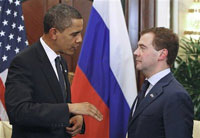Russia's Hopes for New Arms Reduction Treaty Based on Myth
The Asian-Pacific Economic Cooperation Summit in Singapore (APEC) finished quickly. Formally, the forum lasted for two days – November 14 and 15 – but closed on Sunday morning. The agenda of the summit, just like its final declaration, did not differ much from official subjects and final documents of other recent international forums. The list included the economic crisis, the stimulation of economy, investments and climate problems.

The political constituent of the summit was much more interesting. For Russia’s Dmitry Medvedev, the Singapore summit was the fist international meeting that he had after his state-of-the-union address, which outlined a difference in Russia’s foreign politics. The Russian president had official meetings with Japanese Prime Minister Yukio Hatoyama and China’s leader Hu Jintao.
The talks with the Japanese PM were devoted to the issues of humanitarian and economic cooperation, which, as Medvedev said, did not lose their importance against the background of the signing of the peace treaty and the territorial dispute regarding the Kurile islands.
Hatoyama confirmed that the Japanese administration was ready to continue to develop relations with Russia regardless of the peace treaty. The prime minister described Japan’s relations with Russia as strategically important.
The details of Medvedev’s visit with Hu Jintao are not known. There were several statements made for the press about the launch of the cooperation program between China’s provinces and Russia’s Far East.
Medvedev’s meeting with his American counterpart Barack Obama became the central political intrigue of the summit. Everyone was expecting the presidents to release landmark statements regarding the possibility to sign the new arms reduction treaty at the end of November. However, the presidents simply demonstrated their mutual friendliness and made several abstract statements. Obama said that the reset button had been pushed. The two presidents stated that the agreement would be signed in due time despite technical and political differences.
Michael McFaul, the National Security Council advisor for Russia and Eurasia, stated in Singapore that the new START Treaty would not be ratified by December 5, when the previous treaty expired. Therefore, Moscow and Washington would have to pass an interim agreement.
As a matter of fact, this is exactly what many experts said a month ago, so there is nothing new about it. However, the fact that such a high-ranking official as Mr. McFaul said something about the complicated procedure to approve the new agreement at the US Senate and the Russian State Duma, means that there is a political struggle going on in the American administration.
The statements regarding the Iranian nuclear problem and the change of the USA’s strategy in Afghanistan were just as dubious. Medvedev said that Moscow was hoping for the peaceful solution of Iran’s nuclear program, but then added that Russia and the USA would be ready to resort to other methods for showing influence on Teheran.
As for Afghanistan, Mr. McFaul made everything clear for everyone. He stated that the US administration was changing its strategy in the country indeed, but he asked everyone not to bother about it.
After the APEC Summit, Obama left to China for a three-day visit. Medvedev stayed in Singapore for official talks with the government of the Asian nation.
For Russia, the APEC Summit ended with a failure of the talks about the new strategic arms reduction treaty, a change in Russia’s traditional approach to Iran, humiliating comments about America’s “innovative politics” in Afghanistan and “sweat friendship” with President Obama, who already landed in Beijing.
Natalia Serova
Utro
Russia Today: Medvedev, Obama talk START
Subscribe to Pravda.Ru Telegram channel, Facebook, RSS!


